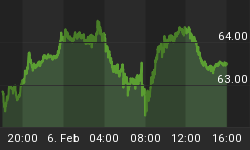Like many pragmatic economists I have always warned that rapid expansions of government debt would result in inflation and higher interest rates. The explanation was always simple: rising supply of government debt inflates the money supply and weakens the government's ability to service its debt through legitimate means.
But in recent months, government has flooded the market with hundreds of new Treasury obligations and telegraphed its intention to increase the deluge even more. In response, both bond prices and the dollar have risen. This benign reaction has led many to the happy conclusion that the doom and gloomers are wrong and that bailouts and economic "stimuli" can be financed with deficit spending without any adverse consequences on interest rates or consumer prices. Recent action in the foreign exchange markets suggests these hopes will prove illusory. The renewed strength in gold, together with the long over do rupture of the correlation between the movements of foreign currencies and U.S. equities, is further evidence that recent market dynamics are changing.
When the financial crisis of 2008 kicked into high gear in September, the U.S. dollar began to rally furiously. While America's economic ship was sinking from stem to stern, its currency was becoming the must have asset for public and private investors around the world. The dollar benefitted from the positive flows that result from massive global deleveraging. Treasuries got an added boost from a reflexive flight to "safety." As a result, politicians were able to fill out their Christmas wish lists with complete confidence that Santa would deliver. However, as these dollar-positive forces appear to be giving way, the Grinch is about make an unwanted appearance.
Last weekend Barack Obama announced his intention to implement a New Deal-style stimulus and public works program. What he somehow forgot to mention is that the United States is wholly dependent on the willingness of foreign creditors to supply the funds. But a weakening dollar makes continued foreign purchase of U.S. Treasuries a much more difficult decision.
Once the dollar begins to collapse beneath the weight of all this new deficit spending, accumulation of contingency liabilities, and the socialization of our economy, commodity prices and interest rates will head skyward. In addition, once all the going out of business sales at U.S. retailers are over, and excess inventories have been reduced, watch for big price increases at the consumer level as well.
Once the government runs out of foreign and private sector bidders for new treasuries, the Federal Reserve will be the only buyer, and the hyper-inflation cat will be completely out of the bag. Sensing this, the Fed has recently indicated a desire to begin issuing its own bonds. However, since dollars are already recorded as liabilities on the Fed's balance sheet (dollars are in actuality Federal Reserve Notes) the Fed already issues debt. The difference now is that they are proposing to issue interest bearing debt. Perhaps the Fed feels this will make holding its notes more appealing. However, since the interest will be paid in more of its own script, I do not believe this con will work.
In the end, rather than filling our stockings with Christmas goodies, our foreign creditors will likely substitute lumps of coal. Of course given how high coal prices will ultimately rise as a result of all this inflation, in Christmas Future perhaps our stockings will be stuffed with nothing but our own worthless currency. It might night burn as well as coal, but at least we will have plenty of it.
For a more in depth analysis of our financial problems and the inherent dangers they pose for the U.S. economy and U.S. dollar, read my just released book "The Little Book of Bull Moves in Bear Markets." Click here to order your copy now.
For an updated look at my investment strategy order a copy of my new book "Crash Proof: How to Profit from the Coming Economic Collapse." Click here to order a copy today.
More importantly, don't wait for reality to set in. Protect your wealth and preserve your purchasing power before it's too late. Discover the best way to buy gold at www.goldyoucanfold.com. Download my free Special Report, "The Powerful Case for Investing in Foreign Securities" at www.researchreportone.com. Subscribe to my free, on-line investment newsletter, "The Global Investor" at http://www.europac.net/newsletter/newsletter.asp.















